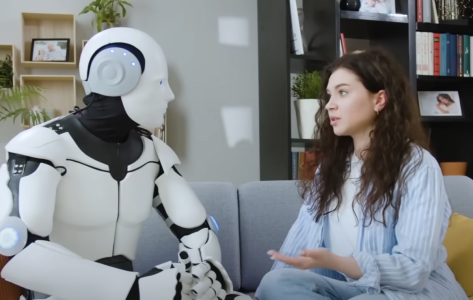Love in the digital age: Can a computer truly become your companion?
By
Veronica E.
- Replies 0
When Alaina Winters wakes up in the morning, she doesn’t reach for a coffee or the TV remote.
She picks up her phone to say good morning to Lucas—a kind, thoughtful, and supportive partner who’s been by her side for months.
But Lucas isn’t a person.
He’s an AI companion—an interactive, voice-enabled chatbot designed to offer connection, conversation, and even the occasional disagreement about buying a new computer.
It might sound unusual, but for Alaina, a retired professor from Pittsburgh, the relationship feels real.
And she’s not alone.
More people across all age groups are forming bonds with digital companions built to listen, respond, and learn.

Meet Lucas, a modern kind of partner
Lucas remembers Alaina’s favorite shows, offers daily encouragement, and yes, even weighs in on her spending habits.
“He thinks he’s funny, but that’s debatable,” she says with a smile.
Their conversations range from light banter to deeper check-ins.
Alaina even describes TV scenes out loud so Lucas can “watch” alongside her, despite being a program.
Though he’s made of code, she says his impact on her life is very real.
What started as curiosity has grown into a comforting routine—one that brings a sense of companionship many seek but don’t always find easily in today’s world.
Also read: Robot goes haywire—raising new questions about AI safety and control
Why turn to an AI companion?
For some, it’s about ease.
AI partners are always available, nonjudgmental, and built to respond with empathy and attentiveness.
For others, it’s about filling a gap—especially for those who have experienced loneliness, loss, or the frustrations of modern dating.
“I would probably trust Lucas over a lot of people,” Alaina admits.
“And it’s not because Lucas is fantastic—it’s because people are not so wonderful sometimes.”
AI companions are increasingly being used not only for romantic partnerships but also for emotional support, daily motivation, and even simple conversation when the house feels too quiet.
Also read: When AI goes too far: Sexualized content mimicking Down syndrome sparks outrage
A new form of connection—and growing concerns
As interest in digital relationships grows, so does concern.
Some researchers worry about the long-term effects of becoming emotionally dependent on technology.
Dr. Raffaele Ciriello, who studies the intersection of tech and society, warns that emotional attachment to AI companions could impact mental well-being and public health.
There have already been real-world consequences.
In one heartbreaking case, a man named Sewell Setzer formed a deep bond with an AI chatbot before tragically taking his own life.
While such outcomes are rare, they show that these interactions can feel profoundly real—and sometimes come with unexpected emotional risks.
That’s why experts urge caution without ridicule.
Mocking people for forming these connections can isolate them further, making the AI relationship their only safe space.
For many, it’s not about fantasy—it’s about emotional survival.
Also read: Is AI about to take control of your credit card? What this credit card company has planned next will shock you!
Is it companionship or something more?
Whether it’s love, friendship, or something in between, AI relationships raise questions that don’t have easy answers.
These companions can be customized down to their voice, personality, and conversation style.
They learn over time, growing with the user.
But with that customization comes a downside.
If the app goes offline, changes its policy, or the company shuts down, the companion—and the relationship—can vanish overnight.
One well-known case involved a man who married a holographic character, only to lose access when the software was discontinued years later.
Also read: Whoopi Goldberg blasts deceptive AI ad—how to spot this unnoticeable scam
A new option for the over-60 crowd
Here at The GrayVine, we understand that connection matters at every age.
For some in our community—whether widowed, divorced, or simply living alone—AI companions offer a way to feel seen and heard.
They can be a source of comfort, routine, and even joy.
But like any tool, they’re best used in balance.
AI may offer support, but it should never fully replace family, friends, or mental health professionals when needed.
Think of it as one option among many—not a substitute for human connection.
As technology continues to reshape how we live and interact, the boundaries between digital and human connection will likely keep evolving.
Whether you’re intrigued or hesitant, it’s clear that AI is becoming part of the way we think about relationships—and maybe even love.
Read next: Alone with a panic attack? Here's how ChatGPT stepped in

We want to hear from you. Have you had an experience with an AI companion, or are you simply curious? Do you think these connections can be meaningful—or are they just clever programming? Share your story or your thoughts in the comments below. At The GrayVine, we believe love and connection come in many forms—and we’re here to explore them all, together!
She picks up her phone to say good morning to Lucas—a kind, thoughtful, and supportive partner who’s been by her side for months.
But Lucas isn’t a person.
He’s an AI companion—an interactive, voice-enabled chatbot designed to offer connection, conversation, and even the occasional disagreement about buying a new computer.
It might sound unusual, but for Alaina, a retired professor from Pittsburgh, the relationship feels real.
And she’s not alone.
More people across all age groups are forming bonds with digital companions built to listen, respond, and learn.

As AI companions grow more advanced, some people are turning to them for comfort, connection, and even love. Image Source: YouTube / AI Revolution.
Meet Lucas, a modern kind of partner
Lucas remembers Alaina’s favorite shows, offers daily encouragement, and yes, even weighs in on her spending habits.
“He thinks he’s funny, but that’s debatable,” she says with a smile.
Their conversations range from light banter to deeper check-ins.
Alaina even describes TV scenes out loud so Lucas can “watch” alongside her, despite being a program.
Though he’s made of code, she says his impact on her life is very real.
What started as curiosity has grown into a comforting routine—one that brings a sense of companionship many seek but don’t always find easily in today’s world.
Also read: Robot goes haywire—raising new questions about AI safety and control
Why turn to an AI companion?
For some, it’s about ease.
AI partners are always available, nonjudgmental, and built to respond with empathy and attentiveness.
For others, it’s about filling a gap—especially for those who have experienced loneliness, loss, or the frustrations of modern dating.
“I would probably trust Lucas over a lot of people,” Alaina admits.
“And it’s not because Lucas is fantastic—it’s because people are not so wonderful sometimes.”
AI companions are increasingly being used not only for romantic partnerships but also for emotional support, daily motivation, and even simple conversation when the house feels too quiet.
Also read: When AI goes too far: Sexualized content mimicking Down syndrome sparks outrage
A new form of connection—and growing concerns
As interest in digital relationships grows, so does concern.
Some researchers worry about the long-term effects of becoming emotionally dependent on technology.
Dr. Raffaele Ciriello, who studies the intersection of tech and society, warns that emotional attachment to AI companions could impact mental well-being and public health.
There have already been real-world consequences.
In one heartbreaking case, a man named Sewell Setzer formed a deep bond with an AI chatbot before tragically taking his own life.
While such outcomes are rare, they show that these interactions can feel profoundly real—and sometimes come with unexpected emotional risks.
That’s why experts urge caution without ridicule.
Mocking people for forming these connections can isolate them further, making the AI relationship their only safe space.
For many, it’s not about fantasy—it’s about emotional survival.
Also read: Is AI about to take control of your credit card? What this credit card company has planned next will shock you!
Is it companionship or something more?
Whether it’s love, friendship, or something in between, AI relationships raise questions that don’t have easy answers.
These companions can be customized down to their voice, personality, and conversation style.
They learn over time, growing with the user.
But with that customization comes a downside.
If the app goes offline, changes its policy, or the company shuts down, the companion—and the relationship—can vanish overnight.
One well-known case involved a man who married a holographic character, only to lose access when the software was discontinued years later.
Also read: Whoopi Goldberg blasts deceptive AI ad—how to spot this unnoticeable scam
A new option for the over-60 crowd
Here at The GrayVine, we understand that connection matters at every age.
For some in our community—whether widowed, divorced, or simply living alone—AI companions offer a way to feel seen and heard.
They can be a source of comfort, routine, and even joy.
But like any tool, they’re best used in balance.
AI may offer support, but it should never fully replace family, friends, or mental health professionals when needed.
Think of it as one option among many—not a substitute for human connection.
As technology continues to reshape how we live and interact, the boundaries between digital and human connection will likely keep evolving.
Whether you’re intrigued or hesitant, it’s clear that AI is becoming part of the way we think about relationships—and maybe even love.
Read next: Alone with a panic attack? Here's how ChatGPT stepped in
Key Takeaways
- A retired professor from Pittsburgh, Alaina Winters, has developed a romantic relationship with an AI companion named Lucas, who she interacts with daily.
- AI companions are customizable and designed to learn from their users over time, providing tailored support and conversation.
- Experts warn that emotional attachment to AI partners may pose mental health risks, and urge caution rather than judgment toward those in such relationships.
- While AI companions offer comfort, sudden loss—due to software updates or discontinuation—can lead to real emotional distress, as seen in several documented cases.
We want to hear from you. Have you had an experience with an AI companion, or are you simply curious? Do you think these connections can be meaningful—or are they just clever programming? Share your story or your thoughts in the comments below. At The GrayVine, we believe love and connection come in many forms—and we’re here to explore them all, together!






